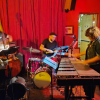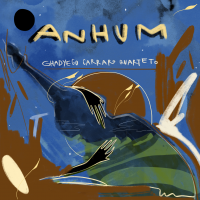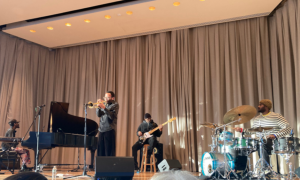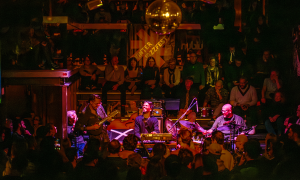Home » Jazz Articles » Live Review » Arturo O'Farrill & The Afro Latin Jazz Ensemble at Miner...
Arturo O'Farrill & The Afro Latin Jazz Ensemble at Miner Auditorium
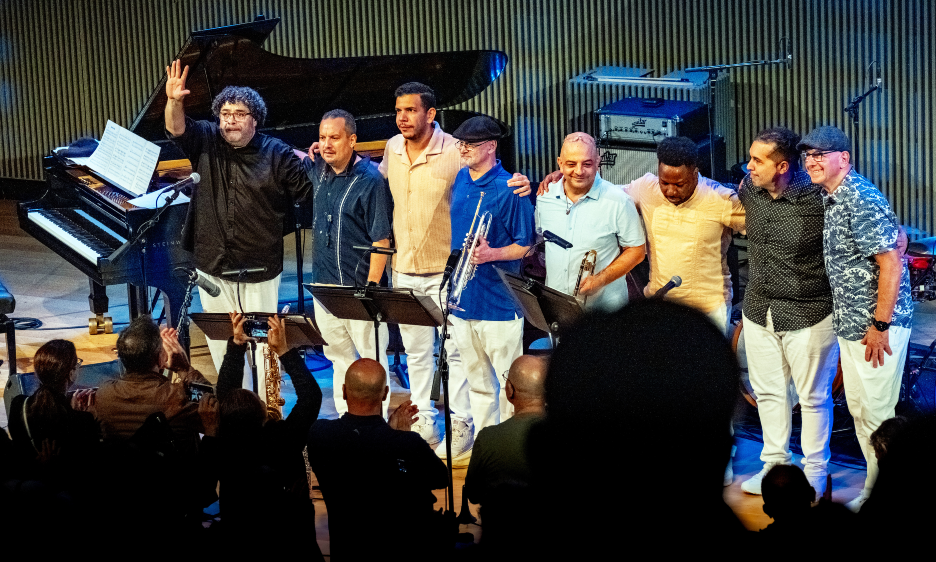
Courtesy Steve Roby
We do this because if you do it right, the music disappears… our spirits are commingling in a way that can never be repeated.
—Arturo O'Farrill
Miner Auditorium
San Francisco, CA
September 28, 2025
What you noticed first was the circle. Not a literal one—the chairs sat in standard rows—but a social circle that materialized as soon as Arturo O'Farrill addressed the room. He joked, testified, and conducted—in short bursts of fingers and eyebrows—an octet that behaved like a civic body. Before the opening tune cooled, he framed the night's thesis: urgency yoked to fellowship. The first piece, "Not Now, Right Now," by Afro-Puerto Rican trombonist and poet Pablo Vazquez, landed as a call to action that was musical first and political by consequence; the percussion choir—cajón, congas, and trap set—tiled a floor for the horns to stride across. Within minutes, Miner Auditorium sounded like a town square where opinions travel by rhythm.
O'Farrill presented Afro-Latin jazz as more than a stylistic enclave. It was a meeting ground. He said as much when he introduced "El Sur," saluting Peruvian trumpeter-composer Gabriel Alegria. The arrangement carried a lilt that blended indigenous Peruvian elements and African roots into modern improvisation—an "ancient future," as he called it from the stage. Jim Seeley's trumpet—shaped by time with Ray Charles and the Afro-Caribbean big-band lineage—cut clarion lines while the rhythm team shifted the ground beneath him, turning pulse into argument and back again.
That argument inevitably led to Cuba. O'Farrill spoke of his father, Chico O'Farrill, as the composer who widened jazz's map and placed the Americas at its center with suite-scaled Afro-Cuban logic. The son honored that geography by refusing to let it calcify. "Guajira Simple," by Alexis Bosch, arrived as a living negotiation—between danzón grace and post-bop harmony, between guajira cadence and contemporary pressure. O'Farrill's piano touch—more water than hammer, by his description—flowed through the keys with unforced, legato logic, pushing ideas forward without manhandling the instrument.
Mid-set came the axial statement, "Clump Unclump," O'Farrill's celebration of cycles—the way realities gather and scatter, then gather again. The writing mirrored the theme: short phrases swarmed and dissipated; the horns knotted into machine-like unisons before shattering into staggered counterlines. Vince Cherico's cymbal work and Keisel Jimenez Leyva's small-drum accents made the music breathe in odd-numbered places; Carlos Maldonado's congas answered in properly West-Hemispheric polyrhythm. The piece functioned as both a physics lesson and a social practice, a reminder that groove is what communities do when they agree on time.
Stage stories were never throwaways; they framed the music. One concerned Fandango at the Wall, O'Farrill's long-running project that unites musicians across the San Ysidro—Tijuana border—sometimes literally through the fence. His tale of an "interspecies jam session" with a Tijuana dancing horse could have played as shtick, but in his telling, it became a parable: turn instruments of division into vessels of joy. The band followed with "El Margasher," a Yucatán folk song retuned for the octet, and the room tilted toward fiesta without surrendering complexity.
Personnel mattered—and not just for résumés. Tenor saxophonist/flutist Ivan Renta, a preeminent yet underrecognized voice with deep roots in Tito Puente's world, gave the music a speaking tone; you could hear the street and the conservatory sharing a common diaphragm. Trombonist Rafi Malkiel added burnished, North-African-tinged inflections that widened the band's color field. Seeley's lead trumpet—focused, never strident—carried the shapely lyricism associated with the great Afro-Caribbean big-band lineages yet worked as persuasively in small-group dialogue. At the core, bassist Raúl Reyes Bueno kept time the way good historians do: by telling you where you had been with each beat, then implying the next place you ought to go. Early on, O'Farrill also tipped his cap to The Afro Latin Jazz Ensemble's broader recorded legacy, name-checking Four Questions (ZOHO Music, 2020) as a reminder that his band treats composition as inquiry rather than ornament.
The set's penultimate surge nodded to Oscar Hernandez with a rumba O'Farrill introduced as "Rumba Urbana," the kind of hard-swinging closer that treated the clave not as a cage but as a set of open doors. Here, the percussion triumvirate wrote the review in real time—Maldonado staking the tumbao, Jiménez Leyva answering with metallic flares, and Cherico dropping snare-drum consonants that turned the dance into grammar. Over the top, Renta's tenor shouted, then whispered; Malkiel answered from the waist of the horn; O'Farrill's right hand, water again, outlined fresh changes that made the familiar feel vanguard.
After the ovation, O'Farrill returned with the full ensemble and paused to speak about the life behind the music. "We are not crypto trillionaires," he said with a half-smile. "We are working artists." The laugh that followed was not only at the joke; it acknowledged the grind—airport tedium, side hustles between gigs, the stubborn faith it takes to keep a band together. Then he offered the credo that has animated projects from Fandango to Belongó: "We do this because if you do it right, the music disappears... our spirits are commingling in a way that can never be repeated." The band sealed that sentiment with "Scapular," an encore drawn from a ballet score: melody suspended over a percussion hush, then settling into a communal shimmer that felt more like benediction than bows.
Seasoned jazz listeners know the temptation, when confronted with Afro-Latin music of this caliber, to count styles: a rumba here, a guajira there, a touch of festejo over a son-derived bass line. O'Farrill did not curate a sampler. He built a room. His nonprofit work under the Belongó banner—an effort to open Casa Belongó in East Harlem as a public commons for art—clarified the aesthetic: "The arts belong to the people," he repeated, and the music bore it out. Pieces arrived as invitations to belong, not permissions to spectate; the audience was treated as a second percussion section, responsible for energy and attention. In that sense, the night's most radical act was procedural. By letting the band and the crowd co-author the experience, O'Farrill positioned Afro-Latin jazz not as repertoire but as polity.
That polity had a history, and the performance honored it without nostalgia. The thought of Chico hovered—less a shadow than a pressure system—whenever lines interlocked bebop syntax with Cuban counter-rhythm. Yet the son's voice was unmistakably his own: a water-touch at the piano; a taste for humor that nodded to Carla Bley's mischievous rigor; an insistence that pieces like "Clump Unclump" could stage philosophical debates without sacrificing dance. The horn voicings stayed fresh, never defaulting to thick unisons for volume; instead, O'Farrill preferred translucence, so one could hear how each line negotiated with the others. When the band did converge—especially on cadential shouts—the effect was less big-band bombast than collective declaration.
What did it all mean? Not that the Americas are a melting pot—melting is too passive—but that the Americas are a canon in the making, revised nightly by whoever shows up ready to listen and answer. As the encore dissolved, O'Farrill's larger wager became audible: music can model the society it hopes to midwife—one where time is shared, differences are voiced, and the groove keeps us honest. His place in the lineage felt secure because he treats lineage as a living responsibility. The forward motion continues—fresh commissions, new collaborations, and, if the vision holds, more rooms to build where the arts belong to everyone.
Setlist
"Not Now, Right Now"; "El Sur"; "Guajira Simple"; "Clump Unclump"; "El Margasher"; "Rumba Urbana." Encore: "Scapular."Tags
Live Review
Arturo O'Farrill
Steven Roby
United States
California
san francisco
Pablo Vazquez
Gabriel Alegria
Jim Seeley
Ray Charles
Arturo "Chico" O'Farrill
Vince Cherico
Keisel Jimenez Leyva
Carlos "Carly" Maldonado
ivan renta
The Afro Latin Jazz Ensemble
Oscar Hernandez
PREVIOUS / NEXT
Arturo O'Farrill Concerts
Feb
28
Sat
Support All About Jazz
 All About Jazz has been a pillar of jazz since 1995, championing it as an art form and, more importantly, supporting the musicians who make it. Our enduring commitment has made "AAJ" one of the most culturally important websites of its kind, read by hundreds of thousands of fans, musicians and industry figures every month.
All About Jazz has been a pillar of jazz since 1995, championing it as an art form and, more importantly, supporting the musicians who make it. Our enduring commitment has made "AAJ" one of the most culturally important websites of its kind, read by hundreds of thousands of fans, musicians and industry figures every month.



